Ministry of Jal Shakti
District Collectors’ Peyjal Samvad under JJM: Dialogue to Strengthen Local Governance and Sustainability Mechanisms
Democratising Water Governance through Structural Reforms at District and Panchayat Levels
Empowering Grassroots Stakeholders for Shared Custodianship of Rural Piped Water Supply Systems under JJM
प्रविष्टि तिथि:
14 OCT 2025 5:10PM by PIB Delhi
As Jal Jeevan Mission (JJM) has reached a remarkable milestone, providing tap water access to over 15.71 crore (81.17%) rural households, it now stands at a crucial juncture. As the Mission enters its next phase, focused on ensuring long-term sustainability, functionality, and service delivery, the role of district administrations has become pivotal. District Collectors act as the crucial bridge between policy and people, ensuring that every household not only receives tap water but continues to receive it reliably and sustainably.
Recognising this, the Department of Drinking Water and Sanitation (DDWS), Ministry of Jal Shakti, organised the first District Collectors' Peyjal Samvad on today — a national dialogue aimed at strengthening district-led governance, promoting innovation, cross-sharing, and peer learning among districts under JJM.
The event was held through a video conference and was chaired by Shri Ashok K. K. Meena, Secretary, DDWS in the presence of Shri Kamal Kishore Soan, Additional Secretary & Mission Director, National Jal Jeevan Mission (NJJM), Smt. Swati Meena Naik, Joint Secretary, NJJM, along with senior officials, District Collectors/ District Magistrates from across the country, Mission Directors and State Mission teams from States/UTs.
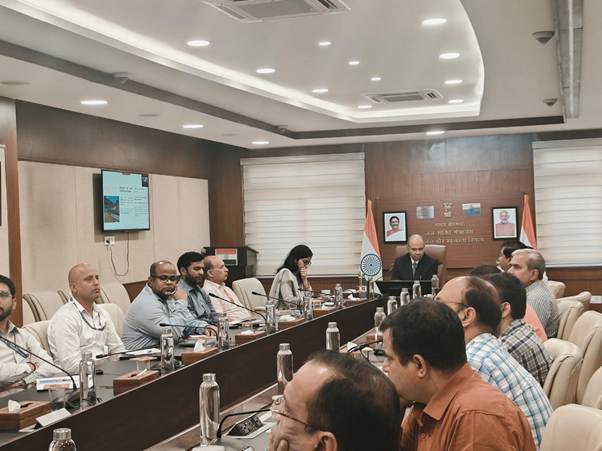
This initiative builds on a sustained reform programme to empower districts and local institutions in managing rural water systems. Over recent months, DDWS has engaged in in-person and virtual dialogues with 729 District Collectors, provisioned dedicated JJM-IMIS District/DWSM Dashboards with integrated feedback modules, and deployed a Panchayat dashboard aligned with eGram Swaraj as part of a whole-of-government approach. Complementing these measures, rigorous field visits have been undertaken and, in partnership with QCI, more than 80,000 Sarpanches have been engaged through the Sarpanch Samvad mobile application, deepening local ownership and accountability. Together with citizen-facing tools like WQMIS and the Citizen Corner, and PM Gati Shakti integration for spatial mapping, these interventions have created a transparent, data-driven ecosystem where district leadership can showcase innovations, best practices, and community-led governance models.
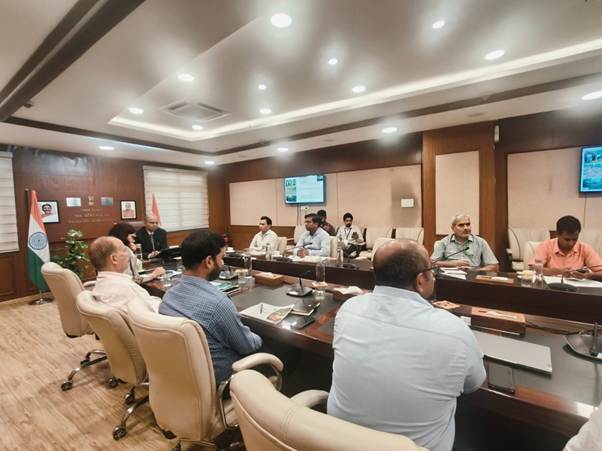
In his keynote address, Shri Ashok K. K. Meena, Secretary, DDWS, emphasised that Jal Jeevan Mission, having reached over 81% rural household coverage, has entered its next phase focused on institutional consolidation, accountability, and sustainability.
He observed that every district has its own remarkable solutions, innovations, and best practices, shaped by local realities and leadership. The District Collectors’ Peyjal Samvad, he said, is an opportunity to identify such scalable and replicable models that can inspire cross-learning and guide policy improvement across States.
“We must make local institutions the backbone of rural water services, where decisions are data-driven, operations are accountable, and communities are empowered to sustain what has been built.”
This was followed by presentations by the District Collectors from East Khasi Hills (Meghalaya), Ganjam (Odisha), Ratnagiri (Maharashtra), Charaideo (Assam), Dhamtari (Chhattisgarh) and North Tripura (Tripura), highlighting innovative district-level initiatives for sustainable rural water service delivery. The key approaches included source protection through catchment plantations, robust monitoring mechanisms and regular field reviews, SHGs-led maintenance and user charge collection, strengthened group water supply models, and technology-enabled grievance redressal platforms.
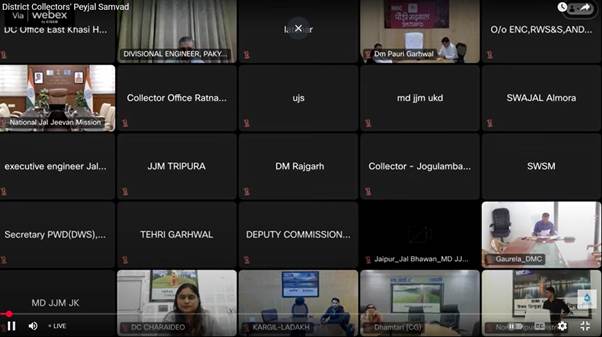
The Secretary, DDWS appreciated these efforts and lauded the proactive leadership of the District Collectors, noting that such innovations and field-level practices would serve as valuable learnings for other districts across the State/UTs.
Digital Transformation: RPWSS IDs Build Transparency and Accountability
Smt. Swati Meena Naik, Joint Secretary, National Jal Jeevan Mission, presented the roadmap for ensuring sustainable, efficient, and accountable rural water service delivery in the next phase of JJM. She underlined the growing role of digital transformation in strengthening rural water governance. She reflected on key questions guiding the next phase of the Mission — why the Rural Piped Water Supply Scheme (RPWSS) ID Module is important, how it will improve service delivery, benefit citizens, and what role District Collectors will play in its implementation.
She explained that the RPWSS ID Module forms a key pillar of JJM’s Digital Public Infrastructure, assigning a unique digital identity to every water supply scheme to enable real-time tracking, predictive maintenance, and transparent monitoring. Integrated with PM Gati Shakti, it supports spatial planning, data-driven decisions, and convergence with other developmental programmes.
While presenting, she went on to say that for District Administrations, the RPWSS ID Module means stronger monitoring, efficient coordination, and data-backed decision-making. It will allow DCs to track the performance of Gram Panchayats, rank efficiency, plan maintenance, and optimise resources across departments.
Similarly for Gram Panchayats, the module offers geo-referenced layouts and digital maps, supporting day-to-day maintenance, early damage detection, and preventive action. The digital availability of asset and aquifer data will aid in long-term planning, efficient budgeting, and sustainability measures.
Importantly, the system establishes strong forward and backward linkages, connecting village-level data with district and state planning frameworks, and linking policy and financial decisions back to ground realities. This ensures that every intervention, from planning to funding and maintenance, is aligned and traceable.
She said that for citizens, it aims to ensure greater transparency and faster response. Digital maps will track pipelines up to the household level, while online water quality data and grievance platforms will enable people to raise issues directly, further strengthening Jan Bhagidari and trust in service delivery.
Smt. Naik emphasised that District Collectors and District Water and Sanitation Missions (DWSMs) are central to this effort, ensuring accurate mapping, functionality assessments, and coordination across departments. By linking every scheme digitally and fostering participatory monitoring, the initiative aims to make service delivery more efficient, accountable, and citizen-responsive.
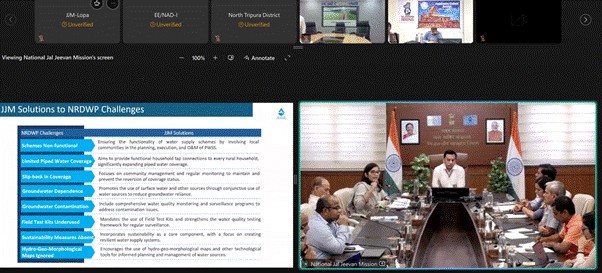
Way Forward: Building Systems That Last
Shri Kamal Kishore Soan, AS&MD-NJJM,in his closing remarks, commended the proactive engagement of District Collectors and State teams, emphasising that JJM has evolved from a scheme of infrastructure creation to a movement of governance reform, decentralisation, and people’s participation.
He emphasized on visible presence of regulatory arrangements to complement the efforts being made for community empowerment, and paying due attention for security and protection of rural pipe water infrastructure and protection of water sources from contamination through regulatory monitoring.
He stated that the District Collectors’ Peyjal Samvad will be institutionalised as a recurring national platform for peer learning, innovation exchange, and collaborative problem-solving among districts.
Concluding his address, he reflected on the essence of the Mission, saying — “जल बचेगा, तो जल रहेगा और अगर जल रहेगा तो जल मिलेगा।” (If we save water, it will endure — and only if it endures, will it be available to us.)
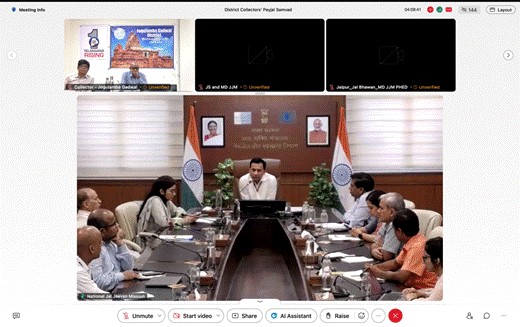
Towards Sustainable Rural Water Governance
As the Mission transitions from infrastructure delivery to sustained service provision, the District Collectors’ Peyjal Samvad marks a pivotal step in building a governance model rooted in strong institutions, community ownership, and digital transparency.
The Department reiterated that achieving Har Ghar Jal is not the end, but the beginning of a new era of responsible, community-driven, and digitally empowered rural water governance, ensuring that every village in India stands as a model of resilience, dignity, and shared custodianship.
***
ND
(रिलीज़ आईडी: 2178957)
आगंतुक पटल : 2773